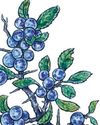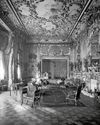
CHANDLER’S HOUSE stands in Pewsey Vale with a clear view of the Alton Barnes White Horse, a huge chalk figure cut into the slope of Milk Hill in 1812. It’s a house without a public front, in the sense that it presents to the narrow access lane behind little more than a long, deep catslide roof. That makes the experience of passing into the property all the more surprising. To the west, overlooking the garden, is the façade of the house you might ordinarily expect to see overlooking the street: a neat elevation of about 1700, five window bays wide with a central door and hipped roof (Fig 1). One small asymmetry— a narrow window to the left of the door—lends interest and charm to the whole.
The house is built of brick laid in a neat bond that is exactingly picked out in colour, with red stretchers and headers that have been burnt deep maroon in the kiln, a finish typical of smarter 18th-century buildings in the wider locality. Another mark of the relative expense of the building is its detailing with stone angle quoins, moulded string course and window surrounds. In their original form, the windows were divided by mullions and transoms of stone, but these have since been cut out and replaced with sashes. Despite the careful trimming of the mouldings, the change has left telltale, matching blocks of stone-the truncated ends of the transoms-to either side of several of the openings.
Esta historia es de la edición March 08, 2023 de Country Life UK.
Comience su prueba gratuita de Magzter GOLD de 7 días para acceder a miles de historias premium seleccionadas y a más de 9,000 revistas y periódicos.
Ya eres suscriptor ? Conectar
Esta historia es de la edición March 08, 2023 de Country Life UK.
Comience su prueba gratuita de Magzter GOLD de 7 días para acceder a miles de historias premium seleccionadas y a más de 9,000 revistas y periódicos.
Ya eres suscriptor? Conectar

Kitchen garden cook - Apples
'Sweet and crisp, apples are the epitome of autumn flavour'

The original Mr Rochester
Three classic houses in North Yorkshire have come to the market; the owner of one inspired Charlotte Brontë to write Jane Eyre

Get it write
Desks, once akin to instruments of torture for scribes, have become cherished repositories of memories and secrets. Matthew Dennison charts their evolution

'Sloes hath ben my food'
A possible paint for the Picts and a definite culprit in tea fraud, the cheek-suckingly sour sloe's spiritual home is indisputably in gin, says John Wright

Souvenirs of greatness
FOR many years, some large boxes have been stored and forgotten in the dark recesses of the garage. Unpacked last week, the contents turned out to be pots: some, perhaps, nearing a century old—dense terracotta, of interesting provenance.

Plants for plants' sake
The garden at Hergest Croft, Herefordshire The home of Edward Banks The Banks family is synonymous with an extraordinary collection of trees and shrubs, many of which are presents from distinguished friends, garnered over two centuries. Be prepared to be amazed, says Charles Quest-Ritson

Capturing the castle
Seventy years after Christian Dior’s last fashion show in Scotland, the brand returned under creative director Maria Grazia Chiuri for a celebratory event honouring local craftsmanship, the beauty of the land and the Auld Alliance, explains Kim Parker

Nature's own cathedral
Our tallest native tree 'most lovely of all', the stately beech creates a shaded environment that few plants can survive. John Lewis-Stempel ventures into the enchanted woods

All that money could buy
A new book explores the lost riches of London's grand houses. Its author, Steven Brindle, looks at the residences of plutocrats built by the nouveaux riches of the late-Victorian and Edwardian ages

In with the old
Diamonds are meant to sparkle in candlelight, but many now gather dust in jewellery boxes. To wear them today, we may need to reimagine them, as Hetty Lintell discovers with her grandmother's jewellery